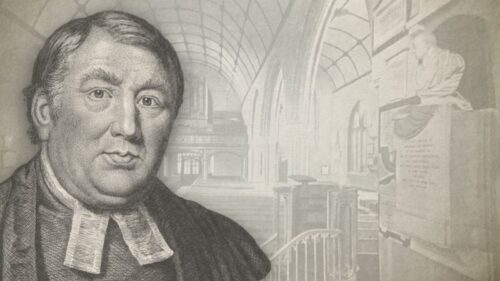
September 13—Morning Devotion
“And thou shalt write them upon the posts of thy house, and on thy gates.”—Deuteronomy 6:9
See, my soul, what a gracious provision the Lord made for the glory and honour of his Israel, that ever traveller passing by might say, ‘Here dwelleth an Israelite indeed; he hath the name of the Lord of Hosts upon his house.’ And did it please the Lord God of Israel so to have his people known, and shall it be not my desire to have thy name, Lord, upon the gates of my house. Shall any pass by my door, ignorant that a lover of the Lord Jesus dwelleth there? Nay, shall I not esteem it my highest honour to have it known whose I am, and whom I serve, in the gospel of’ his dear Son? Shall I be ashamed of that name before which every knee bows in heaven and in earth? Oh Lord Jesus, not only write thy name upon the gates of my house, but engrave it in the centre of my heart, my affections, my first, and last, and earliest, and latest thoughts! Let it be my rapture and my joy, to speak out of the abundance of my heart concerning thee and thy great salvation. In all I say, in all I do, let it be manifest that I am in pursuit of him whom my soul loveth. Let every action tend to recommend thy dear name; and whether at home or abroad, in my house or family, when lying down or when rising up, let all creation witness for me, that the love, the service, the interest, the glory, of my God in Christ, is the one only object of my soul’s desire; and let every thing speak this language; “Whom have I in heaven but thee, and there is none upon earth I desire but thee; and though my flesh and heart fail, yet thou art the strength of my heart, and my portion for ever.”
Robert Hawker (1753-1827) was an Anglican (High-Calvinist) preacher who served as Vicar of Charles Church, Plymouth. John Hazelton wrote of him:
“The prominent features…in Robert Hawker's testimony…was the Person of Christ….Dr. Hawker delighted to speak of his Lord as "My most glorious Christ.” What anxious heart but finds at times in the perusal of the doctor's writings a measure of relief, a softening, and a mellowing? an almost imperceptible yet secret and constraining power in leading out of self and off from the misery and bondage of the flesh into a contemplation of the Person and preciousness of Christ as "the chiefest among ten thousand and the altogether lovely." Christ and Him crucified was emphatically the burden of his song and the keynote of his ministry. He preached his last sermon in Charles Church on March 18th, 1827, and on April 6th he died, after being six years curate and forty-three years vicar of the parish. On the last day of his life he repeated a part of Ephesians 1, from the 6th to the 12th verses, and as he proceeded he enlarged on the verses, but dwelt more fully on these words: "To the praise of His glory Who first trusted in Christ." He paused and asked, "Who first trusted in Christ?" And then made this answer: "It was God the Father Who first trusted in Christ."
Robert Hawker on the Biblical Covenants (Complete)
Robert Hawker's Poor Man's Morning Portions





